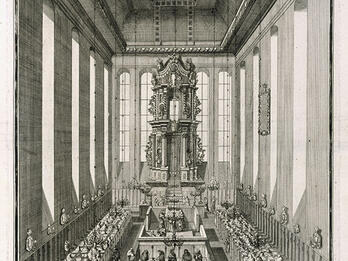Acordos (Regulations): On Synagogue Behavior
In the name of the blessed God.
By virtue of the Regulation made and published on the 18th of Sivan, Yr: 5471 [1711], holding those [boys] of the age of 16 years subject to the orders of the parnasim of T: T:,1 and in view of the scant respect paid to it, and the Messrs. Parnasims [of T: T:] giving as an excuse that they do not execute its terms since the youths are over the age referred to,
We hereby order and fully empower the said Messrs. Parnasim of T: T: to eject from the Synagogue, for the slightest provocation, whatever person or persons may be sitting on the sides of the pulpit who are still under the care of their parents or guardians, no matter of what age. The Parnassim of T: T: can eject them from the Synagogue for the least cause and for that purpose shall call the Samas Ab[raha]m: Lopez Silva. The gentlemen of the Mahamad [board of governors—Ed.] will give their assistance for this and consider the case on the following day. If [the offense is] one of word or deed, he [the culprit] shall pay the fine[s] set forth in the Regulation, which are 50 and 25 Ps., respectively. If he does not have the means to pay, he shall be punished in the schools (sic) like any other pupil, for experience shows us that they imagine that they can keep on causing these disorders because they are not subject to the teachers.
The zeal of all the gentlemen is counted upon in not giving occasion for the execution of the foregoing. And may the Lord inspire us with love and reverence to serve Him, amen.
Done in the H: C:2 of Mikve Israel, the 22nd of Kisleu, Yr. 5478 [1717], and signed in the presence of the gentlemen of the Mahamad and councillors.
David Vas Farro, Treasurer
[ . . . ]
In the name of the blessed God.
On the 12th of Sebath, Yr. 5486 [1726], the gentlemen of the Mahamad and councillors convened and, because of the great veneration which we owe the Sepher Thora, resolved that, henceforth the Raising of the Sepher Thora shall be accorded neither to married men nor to bachelors, but only to the Levantadores3 by turn. Those wishing to enroll for it, if married, must first submit to an examination by the Messrs. Levantadores who will admit no bachelor to the test, for so have the gentlemen of the Mahamad and councillors found proper for the divine respect toward the Sepher Thora.
Hereafter [neither] the gentlemen of the Mahamad, nor any Bahal Asurah [forbidden person—Ed.], nor any other entitled to distribute the Misvot [ritual honor—Ed.], nor the person having the duty of performing a Misva for an absentee, may on any account assign the said Misva to a young bachelor or to a married [Levantador] before his turn, but only to the gentlemen currently so functioning [as Levantadores] and those married men who, having been admitted by the gentlemen of the Mahamad. As this is for the honor of our Holy Law, we trust that it will protect us and that the Lord God will imbue us with His divine Love and Fear and bless all His people of Israel and this H: C: with Peace, Amen!
The said gentlemen of the Mahamad and councillors further order that no one may leave his seat to accompany the Sepher Thora and [thereby] annoy other, under pain of incurring the same penalty expressed in the Regulation about occupying the seat of another, because they find this proper for the Tranquility, Peace and Quiet of this Holy House, and they count on the zeal of all the members in observing it. May God bless His Nation with peace, amen!
Done in the H: C: of Mikve Israel.
Present: The gentlemen of the Mahamad and councillors.
Mordehay Senior, Treasurer
Notes
Words in brackets appear in the source text, unless indicated as added by the editor.
[Talmud Torah—Ed.]
[Holy Congregation.—Ed.]
[Levantador (sing.) is Spanish for “lifter.”—Ed.]
Credits
Published in: The Posen Library of Jewish Culture and Civilization, vol. 5.



